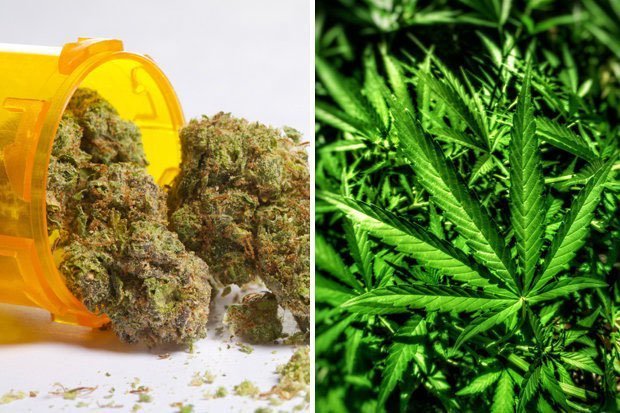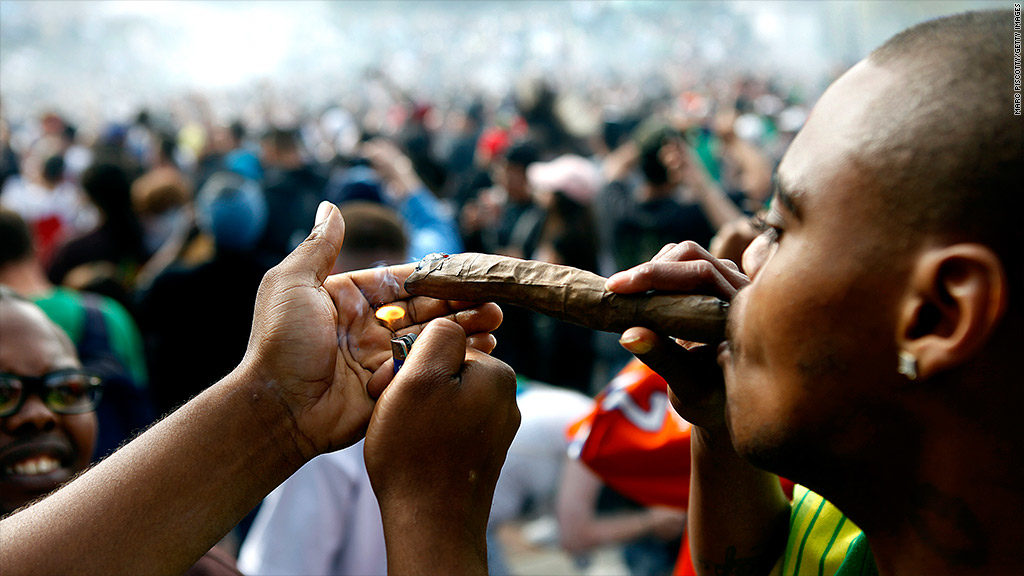A general trend within recent years has been that around this time a new poll comes out suggesting more Americans than ever to be in favor of legalizing marijuana for recreational use. This year was no different: according to a recent CBS poll, sixty-one percent of the public now believes cannabis should be legalized, up by five percentage points from last year. In addition, nearly 9 out of 10 Americans feel medicinal marijuana should be made legal, with higher reported figures among younger generations.
These changing attitudes have brought about swift and noticeable changes to public policy in recent years. Eight states have fully legalized the psychoactive drug for recreational purposes, in addition to the District of Columbia. Twenty one more states have lifted bans on cannabis use for medicinal purposes, an action that typically precedes outright legalization. As for the remaining twenty or so states that have hardline restrictions on most forms of marijuana, they might not have to wait long to get their hands on the dope. So long as current rates continue, more states will likely give into changing mores and lift any remaining bans. As the millennial generation comes to age, which has been the most open-minded to the prospect of legalization to date, the prospect for countrywide legalization becomes foreseeable, if not inevitable.
Nearly half of Americans have admitted to trying the drug at least once, a figure that has also increased with each annual CBS poll. Perhaps most astonishing, in fewer than four decades there has been almost a complete reversal in the number of Americans who favor legalization versus those who oppose; in 1979, sixty-four percent of the nation opposed. Now only thirty-nine percent do.
So what is the impetus behind these changing attitudes?
There are a number of social, legal and economic factors that have driven our society’s transformed (or some might say, “enlightened”) attitudinal shift toward the drug. Arguably the greatest reason was the failure of the so-called “war on drugs”, a federal campaign that was popular throughout the Nixon and Reagan presidencies, but has been increasingly open to derision in recent years. Its critics contend that its policies, estimated to be worth over $1 trillion in aggregate since 1971, wrought havoc on American society by overburdening federal prisons and disproportionately targeting African-Americans and other minority groups. According to the Office of National Drug Control Policy, over $15 billion was spent on the effort in 2010 alone, making it not just a tremendous expense, but an ostensibly futile one, particularly in the wake of a growing heroin epidemic that has ravaged communities across every demographic group.
With the failure of the war on drugs, a new generation of libertarians has adopted a sensible alternative centered on the market’s ability to regulate cannabis, which ultimately yields a safer product for public consumption. This has been the undergirding philosophy for the experiments in states like Colorado and Alaska, which were among the first places to legalize weed for recreational purposes. Pro-market libertarians often point to these cases as illustrations of legal weed done right. Colorado, for example, has a low unemployment rate compared to the national average, a diminishing black market, lower crime and a bonus $100 million in added tax revenue that is being used to build more schools and other projects. There are difficulties, however, that shouldn’t be ignored: levying taxes on weed, similar other “sin taxes” on alcohol and cigarettes, is used to deter excessive usage of the drug. But if the rates are set too high, it will not eliminate the black market, which is one of the main goals for legalization.
Additionally, with legalization follows an implicit societal acknowledgment that marijuana use is benign or even advantageous. Even The Economist, whichsteadfastly backs legalization, professed that prohibitionists and users alike must work together to deter public consumption. Unlike cigarettes and alcohol, whose dangerous effects are well known, marijuana is still in many ways a dark horse. As a result of its long prohibited status, any potentially debilitating long-term consequences have not been scrutinized with surgical precision, and thus lack scientific certainty.
This is where the pro-legalization argument begins to weaken. THC, which is the principal psychoactive constituent in marijuana, is a completely different species than alcohol, tobacco or caffeine. Once it enters the body, it touches nearly every organ and affects both the immune and central nervous system. The body absorbs THC immediately upon ingestion, which can potentially remain in the system for days or even weeks on end, depending on frequency of use and body type. And unlike alcohol, which flushes out of the system in a matter of hours, THC remains stored in fat cells and the brain. Psychologically THC impedes judgment and distorts one’s sense of time, resulting in short-term anxiety and in some cases, depression. And contrary to popular opinion, marijuana can also be addictive, causing dependency in about one in ten users.
The immediate effects of pot use are well known and can easily be researched in greater detail online. The purpose of this piece is not a case study of its potentially harmful long-term physiological effects on the body. It is, however, meant to disclose that for every “miracle case” of a man ostensibly cured of his Parkinson’s trending on social media, there is opposing case of an individual being harmed by its use. For example, shortly after it was legalized there, a man in Colorado experienced a “psychotic episode” from accidentally overindulging pot-laced candies, causing him to murder his wife. This case, albeit hyperbolic, is nevertheless emblematic of what could go wrong when the effects of a product are not fully known. In Colorado, typically the most outrageous of reports made national headlines, such as when small children were accidentally sold pot-laced brownies.
But if you actually dig a little deeper into the data, you will find that many alarming statistics actually go unreported, such as the trebled incidence of fatal automobile accidents in Colorado resulting from more people being under the influence. This is a natural consequence of marijuana’s short-term psychological effects, which impair judgment and can lead to a loss of motor skills, especially when combined with alcohol and other drugs. Granted, the statistics are still quite new, and they are not without error,, but much of the evidence points to the fact that “marijuana related” car accidents have trended northward, and by a substantial amount, since legalization.
In addition to the automobile accident rates that have gone up, perhaps the greater issue of concern is the stigma against pot that gets mitigated upon legalization inadvertently sends the wrong message to teenagers that society condones pot usage. This is supported by the data in the CBS poll, which shows that society in general and young people in particular, feel that marijuana is not a serious harm to one’s health. As expected, more people are experimenting with the drug, and despite the limitations in the data, there is evidence that more teenagers in Colorado are using pot upon its legalization. This problem has become alarmingly prevalent among expectant mothers, many whom are misguided into the belief that pot is harmless, thus making it okay to smoke during pregnancy. Consequently, there have been more reports of prenatal marijuana use, which can ultimately hamper brain development, cognition and leads to lower birth weights of the newborn child.
Lastly, it seems rather ironic that Democrats, being the alleged “party of science”, would be so quick to jump onto the legalization bandwagon when many of the long-term effects of pot are not yet understood, and the states that have permitted recreational use disclose shoddy results at best. The sort of empirical scrutiny they apply to issues like climate change and theology oddly seems to vanish out the door once marijuana becomes the subject of debate. Many of their political leaders who run their campaigns on legalization often point to the failure of the war on drugs, which is perfectly legitimate. So why don’t they propose decriminalization of the drug, but maintain current federal draconian measures on punishing the suppliers? Society has rightly dispensed with the worldview that drug usage itself is inherently wrong and have instead adopted the enlightened stance that drug addiction should be treated like a disease. But we have not moved away from consigning moral culpability to the supplier, who remains a menace to society. Federal laws certainly can be revamped that would grapple with this modern perspective, but there is absolutely no reason at this point to jump the gun to full-blown legalization. Lacking concrete evidence of its long-term effects, as well as the ambiguous results from states that have so far served as laboratories of experiment, it would appear that if they wish to uphold their empirical mantle, liberals should wait longer for the data to run its course and then make a decision after careful, systematic examination.
Libertarians likewise should take a guarded outlook when evaluating Colorado, their magnum opus. Indeed, tax revenues are up – but at what cost? Is the inevitable uptick in pot-users an opportunity cost worth having for such revenues? Given its novelty, the wider societal implications are not fully explored, and the economics of the issue is far from definitive. Meanwhile, as we as a nation cope with a heroin epidemic of historic proportion, it would seem odd to buy into the pro-legalization argument when in fact, there is bountiful evidence to suggest that many addicts of hard core drugs like heroin and cocaine originally began with marijuana. That is not to suggest marijuana is a gateway drug, and yes, there is plenty of evidence that most pot users do not become heroin addicts. Yet there nonetheless is a plethora of evidence that heroin and cocaine addicts started out with marijuana and alcohol. This equally applies to alcoholics and addicts of prescription painkillers, whose conditions often worsen once marijuana, which exacerbates preexisting conditions, is brought into the picture.
This is not to say that the pro-legalization movement is completely wrong in their motives. There were many errors committed over an extended period of time by the so-called prohibitionists, and there is undoubtedly a lot of blame to go around. However, Jeff Sessions and others who maintain the stance that legalization should remain off the docket ought to be praised for their hardline stance, not excoriated. There is still too much we don’t know. The changes in public sentiment have been primarily driven by emotions, not facts. The pro-legalization movement must do away with the fallacy that pot is perfectly benign and move beyond their puerile desire to get high for enjoyment’s sake. It’s probably true that most of the potheads who back legalization aren’t truly looking out for the poor man with Parkinson’s, but are simply looking for an outlet to channel their own desire for altered consciousness into a more socially acceptable end. This may be the crux of the issue: more people in modern times are searching for an escape from the material world. If that is indeed the case, our focus should then ultimately be on the profounder problems of modernity, not on the superficial mechanism through which we can artificially escape it.
credit:fordhampoliticalreview.org













